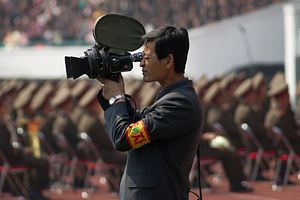North Korea recently aired a series of television programs featuring disabled citizens, part of Pyongyang’s effort to refute accusations from the international community that it routinely violates the human rights of the disabled.
North Korea’s Korea Central Television (KCTV) claimed in a February 11 program that North Korea tries its best to help the disabled to fit in to society. The program noted that Pyongyang offers specialized education for the vision or hearing impaired. KCTV reports that these citizens are very satisfied with the education program.
One month earlier, KCTV told the personal story of Lee Chun-hyang, a 37-year-old North Korean citizen who is visually impaired. Lee told KCTV that she has been happy living in North Korea and insisted that there is no biased view toward the disabled.
There have been several cases of North Korea publishing news articles or editorials about the disabled, but it was the first time Pyongyang has broadcasted television programs in which disabled citizens appeared.
North Korea has been under heavy condemnation for violating human rights, including the rights of the disabled. As a recent example, Ban Ki-moon, the Secretary-General of the United Nations, submitted a U.N. report on human rights in North Korea to the United Nations General Assembly in December 2014. Ban noted that women, children and the disabled were the most vulnerable to rights violations and called for concrete measure to improve the human rights situation in North Korea.
The details of human rights violations against the disabled in North Korea were revealed in August 2013 when U.N.-mandated Commission of Inquiry on Human Rights in the Democratic People’s Republic of Korea (CIO) held a public hearing in Seoul to gather information from a variety of witnesses, including North Korean defectors.
One of the witnesses, Ji Seong-ho, who escaped from North Korea in 2006, vividly recalled his life in North Korea as a disabled person. Ji helped support his family by stealing coal and selling it. While doing so, Ji fell off a train and crushed his left hand and foot, resulting in portions of his limbs being amputated. Ji’s testimony for the CIO was repeated later in an interview with Radio Free Asia.
“The disabled people tend to suffer more in North Korea because they don’t have ability to work. Many of them die of starvation,” Ji told RFA.
Ji also explained how the disabled are discriminated against in North Korea. He told RFA his personal story as an example. Ji was captured by the North Korean authorities after he crossing the border into China to look for food. Ji claimed that he was detained longer and tortured while others in the same situation usually were released in two or three days. Ji was told that he should be punished more severely because he had degraded North Korea’s reputation by attempting to go abroad as a disabled person. He recalled that was the moment when he decided to defect — he thought that North Korea was not where he belonged.
Ji’s testimony continued in December 2014 at an International North Koreans’ Association for Human Rights & Democracy event hosted in London by the All-Party Parliamentary Group on North Korea. Ji once again shared his experience as a disabled person in North Korea.
North Korea reacted immediately by releasing a statement claiming that the testimony at the event was absurd. The statement, carried by Korea Central News Agency, said that North Korea has put forth its best effort in protecting the basic rights of the disabled since the country was established, including signing the United Nations Convention on the Rights of Persons with Disabilities in 2013. The statement added that North Korea has increased cooperation with other nations in order to improve the rights of persons with disabilities.
Experts say recent examples clearly show North Korea is taking an increased interest in matters regarding the disabled, regardless of what the underlying reason is. Kim Yong-hyun, a professor at Dongguk University’s Department of North Korean Studies, told Yonhap News Agency that the North Korean leader Kim Jong-un could be personally interested in these issues.

































